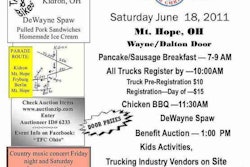While federal regs to cover training and registration of doctors performing physicals approach, carriers and some states are taking the lead to address specific medical conditions such as sleep apnea
In terms of the basics of driver medical certification, says Dr. Ronald Rush of Highway Health Care in Texarkana, Texas, “I really have not seen a lot of activity in the last few years to suggest that drivers are having a lot of problems with certification. The basic exam and qualifications are stable and we have not had to change much of anything.”
Diabetes and blood pressure rules remain stable — get a BP reading over 140/90 and you will get a one-time three-month certification to get it under control. If you’re an insulin-treated diabetic you must go through the rigorous Diabetes Exemption Program process to get certified.
“I think there are two or three states that do what Indiana does with medical certification. If an Illinois carrier can get away without doing as much as is required in Indiana, then there’s some resistance by Indiana carriers.”
– Kenneth Strickland, Administrator, FMCSA Indiana Division
“The exception,” Rush adds, “does seem to be in the area of sleep medicine.” As the science behind diagnosis of sleep apnea has become more well developed over the last two decades, the attention to sleep disorders’ affect on fatigue and thus driver safety has increased. While the Federal Motor Carrier Safety Administration says it does not plan to institute mandatory screening criteria for sleep apnea as a part of the Department of Transportation examination requirements, many carriers require it of drivers with various risk factors. “Many are being told by their companies that apnea testing is coming or their companies are instituting screening and testing programs,” says Rush, adding that most individual companies his facility works with “have some type of screen and only ask some [drivers] to be tested.”
WTI Transport driver candidate Fred McGee of Jackson, Miss., goes through an agility test with Nikki Adamczyk, agility coordinator at Workforce Testing, a division of the AA Pre-Employment Center in Tuscaloosa, Ala. More companies today are requiring agility testing with DOT physicals prior to hiring potential candidates.A former commercial airline pilot, Mike Bartruff turned to trucking after an unsuccessful business venture with his son. He signed on with Prime Inc. in Missouri, whose Orion Healthcare clinic on-site at the main Springfield terminal oversees its medical program. The carrier required a sleep test after an initial screening showed Bartruff had a Body Mass Index measurement above 39. Orion’s Dr. John Abraham says, “We look at neck size, at their airway and how open that is. If it’s really closed off, they’ll be at risk as well.”

In addition, multiple health problems, from diabetes to heart attacks, strokes and high blood pressure, might suggest that sleep apnea could be present as a contributing factor.
In Bartruff’s case, a sleep study confirmed diagnosis of sleep apnea. His treatment includes nightly use of a continuous positive airway pressure (CPAP) machine. His overall cost was $1,900, though costs can certainly run higher that that.
The sleep test, says Dr. Rush, “for a private patient is generally in the $1,300 to $2,000 range in many clinics and can go even higher in a hospital setting. We generally charge the cash-paying trucker around $900.”
Driver Ed Webb, with Prime Hauling of Indiana, paid just $240 for his first CPAP. “I was fortunate enough to get on my employer’s insurance,” he says, “so it was only a $30-$40 copay” for the sleep test itself. Out-of-pocket it would have been $3,500, he says.
Webb is one of many drivers who’ve found themselves feeling “like a lab rat on a treadmill,” he says, in the medical-certification area of late, with the state directly involved in his sleep apnea treatment. His history with the condition starts during a five-month period when he was out of work, during which his girlfriend recommended he be tested for sleep apnea. Tested, he then found a machine on Craigslist and got it, but without a full-face mask at additional cost he was unable to get it to work for him effectively initially. Meanwhile, he went back to trucking with Prime Hauling.
Shortly thereafter, in November of 2009 he was awakened from a rest-area nap by an Indiana state trooper who got things off to a bad start in the stop by telling Webb he was snoring so loudly he was “shaking the truck.” The officer then began to go through the motions of a driver inspection, during which he did something out of the ordinary. The trooper pulled out a PDA and showed Webb a series of questions, asking him if he was willing to “participate in a survey, and I declined it,” Webb says. “By then the warning signs were going off.” He’d heard of the Minnesota fatigue checklist, a version of which Indiana was using at the time. The Minnesota list was deemed to have violated truckers’ privacy rights when a court in February this year returned a verdict against the state.
Webb was nonetheless issued an “ill/fatigued driver” citation, triggering an audit process of his medical certification. He received a large packet from the Indiana Department of Revenue’s Motor Carrier Services division requesting information from him that amounted to a comprehensive medical history. “They might as well have shoved a microscope up my butt,” he says. The questions therein included one probing past history of sleep apnea diagnosis, similar to that on the driver-filled portion of the medical long form that accompanies every medical recertification.
The state requested a download from his CPAP machine to assess the level of its use, requiring a 70 percent usage rate.
If it sounds strange for the state of Indiana to be requiring very specific treatment guidelines for sleep apnea, that’s because it is, in a couple ways.
One is the auditing process itself, which FMCSA Indiana Division Administrator Kenneth Strickland says is applied to every operator with a medical card in Indiana to one degree or another. “Carriers have complained for several years. I think there are two or three states that do what Indiana does with medical certification. If an Illinois carrier can get away without doing as much as is required in Indiana, then there’s some resistance by Indiana carriers.”
Second is the sleep apnea requirement itself. “You won’t find that in the federal regulations — Indiana’s are more stringent than any other state in the U.S.” says Strickland. Indiana requires sleep apnea patients holding state-issued CDLs to “use the unit four hours or more five-to-seven nights a week,” says Diania Alsager, manager of the Indiana Sleep Institute’s sleep lab in New Albany, Ind., which works regularly with truckers.
“We can audit any condition,” says Mary Fleehearty, supervisor for the CDL program of the Indiana Department of Revenue’s Motor Carrier Services division. “If a doctor gives us information that wasn’t on the health certification or we have knowledge of a ticket, if it has to do with a medical condition… we reserve that right to audit.”
Essentially, that’s what was happening to Webb after his ill/fatigued driver citation, in spite of the fact that it was thrown out subsequently by the prosecutor. But Indiana Motor Carrier Services still got wind of the ticket, begging the question: Can a state trooper deem a driver unhealthy during a roadside inspection? FMCSA Office of Medical Programs Director Maggi Gunnels, in a webinar conducted by Truckers News last year, pointed to the ill/fatigued operator regulation 392.3 in the federal code, which reads in part, “No driver shall operate a commercial motor vehicle … while the driver’s ability or alertness is so impaired, or so likely to become impaired, through fatigue, illness, or any other cause.”
FMCSA officials note that federal regulations are intended as minimum standards, and that states can exceed them. But regarding tougher physical standards in states, says FMCSA Associate Administrator of Policy Larry Minor says, “we haven’t really heard anything about that — if there are a lot of drivers not able to operate in those states, we would.”
All the same, he says, “lack of treatment for obstructive sleep apnea may be a reason for a medical examiner to not issue a medical card,” noting the common primary role in determining medical fitness to drive of the medical examiner, a health-care professional, not the state itself.
“I do not recall an instance in the last 10 years where I have been contacted by the state or feds for any reason concerning a driver,” says Dr. Rush, whose practice is located in Texas. “If I get feedback it is usually from the driver’s employer.”
Rick Gobbell, a former FMCSA official in Tennessee now working as a transport safety consultant, heard of Webb’s case with Indiana. “I found that Indiana had cited several drivers [as ill/fatigued], and they do it under the cloak of safety. ‘We have responsibility for the safety of the public. If we feel like a driver has sleep apnea we think he ought to be treated.’ I don’t know why FMCSA is letting these states do that. They don’t seem to know what’s going on. I don’t know why the secretary doesn’t look at it and see where that’s a hindrance to interstate commerce.”
Webb estimates the doctor visits the state audit of his medical certification required, including a paperwork error by the state that delayed his medical recertification and suspended it for a couple of days in February, amounted to at least five days of downtime.
Privacy issues are also a concern for Webb. “We’re battling hours of service issues, CSA,” he says. “When the smoke clears from that, this is going to be the next thing coming down the pike. There are a lot of people with CPAP machines out there. Imagine getting pulled by the DOT cop, and he asks for your medical card. And say it will show where you’re using a CPAP machine. He takes that machine back to his car and downloads data from the machine and makes you medically disqualified right there.”
Apnea Treatment Benefits
Since beginning apnea treatment, Prime Inc.-leased driver Mike Bartruff has lost 35 pounds, down from 270, in a few short months, “and my blood pressure’s getting better,” he says. “I’m on a one-year renewal of my medical card for now, because I had high blood pressure and I was on medication for it, but because of the CPAP and what I’ve been doing, I don’t see that being a factor in my next physical.” Bartruff reports sleeping better since he’s grown accustomed to the device. “I’ve got more energy throughout the day. I walk every day, 35-45 minutes at a time.”
Driver Ed Webb says CPAP treatment has changed his life, echoing other sleep-apnea sufferers whose common refrain is that getting effective, restful sleep boosted their daytime energy levels greatly. “When I had my sleep test done, I could tell the difference right off the bat,” he says. “The next day I felt like superman. I just felt great.”
For a video talk with Webb, visit www.truckersnews.com.
The Second Opinion on Sleep Apnea
During your routine DOT physical, physicians should be screening for sleep apnea. Different physicians have different screening criteria, as do different trucking companies, such as a certain body mass index (BMI) measurement, neck size and the presence of other conditions. Considering the potential cost, getting a second opinion about whether a sleep study is needed in your case is legal and may be appropriate.
But, notes Orion’s Dr. John Abraham, “once you’ve had a sleep study that shows you have sleep apnea, there’s not a lot of gray area there.” Failure to indicate that you’ve tested positive, as it were, on your medical long form would constitute falsifying documents.
From drivers to industry observers, many suggest the health-care industry is “jumping in with both feet” to diagnose and treat the disorder, as owner-operator Bob Harper, leased to Dana Transport, puts it.
Transport safety consultant Rick Gobbell says, “Some of these doctors currently doing medical examinations — they’ve got a lot of them referring drivers to sleep doctors, seeing a new cash opportunity.”
Proposed Registry of Certified Medical Examiners
By Max Kvidera
To help reduce the number of highway accidents caused by truckers with disqualifying medical problems, FMCSA has proposed a National Registry of Certified Medical Examiners (NRCME). The FMCSA contends that improper medical certification of truck drivers has contributed to fatal and serious injury accidents.
Dr. Brent Tidwell, who runs Workforce Testing, a division of the AA Pre-Employment Center, in addition to his chiropractic practice in Tuscaloosa, Ala., gives a trucking job candidate a DOT physical.Currently there is no centralized listing of who is performing DOT physicals, estimated by the FMCSA at more than 400,000 medical practitioners who could perform the examinations. Clinton Smith, a chiropractor who has performed DOT exams since 1994, says anyone can conduct a physical as long as they have a state license and follow the DOT exam form.
The proposal would require that medical professionals undergo training and pass a test before they could be listed in the registry, similar to what’s required for Federal Aviation Administration examiners. Potential medical examiners would include doctors of medicine and osteopathy, chiropractors, advanced practice nurses and physician assistants.
After several delays, the FMCSA will flip the registry switch on Dec. 9, and give it about a year to get organized. Within two years of the start, any carrier with 50 or more drivers will have to use an NRCME examiner. Within three years, all carriers and owner-operators will have to use an NRCME examiner for a physical.
The FMCSA wants medical examiners to be familiar with DOT medical standards and the physical demands of being a commercial truck or bus driver. That’s the expectation now, but there’s no way to determine if the examiner understands the trucker’s job. “That’s been the Achilles heel of the DOT medical exam process up until now,” says Michael Megehee, a chiropractor who’s worked with teams on DOT exam requirements and a medical examiner training course.
For example, Dr. Brent Tidwell, a chiropractor who conducts DOT physicals at his practice in Tuscaloosa, Ala., says he gave a trucker taking medicine for high blood pressure a one-year card. His previous doctor had given him a two-year card. “It plainly states in the regs that if they’re on blood pressure medicine, it’s a yearly checkup,” he says. “He’ll go back to that doctor and I’ll never see him again.”
In 2005 the FMCSA found in California that of 66,000 medical exam reports, 10 percent of commercial drivers were issued certificates as being physically qualified even though the report said the driver shouldn’t have been qualified or should have received a shorter-term medical certificate. In the same year in Indiana, 28 percent of CDL medical exams contained mistakes.
The National Transportation Safety Board doesn’t believe the registry process goes far enough. For one, the NTSB contends the proposal doesn’t completely address medical examiner qualifications. “An example is chiropractors, who don’t have the authority in any state to prescribe medications,” says Dr. Mitch Garber, NTSB chief medical officer. “They nonetheless would be put in the position where they’re having to evaluate the effect of prescribed medications on vehicle drivers.”
Megehee says the planned training will focus on how to evaluate the exam’s results and whether that driver is safe to operate a commercial vehicle. “Over 40 percent of [commercial] drivers have to have a yearly exam because of some kind of medical condition,” he says. “In the past many drivers who had a two-year certificate should have had only one year — or maybe not driving at all.”
Megehee, who heads Team CME, a company that performs DOT exams and alcohol and drug testing, says the registry proposal may help some drivers who would have been taken off the road in the past because of their medical condition.
Dr. Garber isn’t so sure the proposed system will properly identify and treat truckers with serious medical conditions. He says the proposal falls short of being the comprehensive medical oversight program NTSB recommends. “Drivers ought to be medically fit,” he says. “The current system does not assure that. Even with these changes, because there are still fairly significant gaps in the process itself, that outcome is not assured.”
No More Medical Cards in 2012
By Todd Dills
By Jan. 31, 2012, drivers will be required to “submit their medical cards to the state licensing agency,” says FMCSA’s Larry Minor, to comply with the Medical CDL rule, which will turn the current medical-card program into an electronic system tied directly to drivers’ CDLs.
When full implementation is achieved, drivers won’t need to carry a medical card any longer. Medical information will be tied directly to your CDL.
“We’ll be working with the state licensing agencies,” says Minor, “to get out the appropriate reminders” to drivers. “Our intent,” he adds, “is to provide a deterrent to drivers falsifying medical cards. Combined with the [National Registry of Certified Medical Examiners], long-term the plan is to electronically link the two together, and registry doctors will submit driver certifications electronically. We’ll have accurate information on who has the medical card and assurance that the person who issued the medical card is applying the federal standards appropriately and consistently.”
Registry aims to stop abuses
Chiropractor Dr. Clinton Smith says the proposed National Registry of Certified Medical Examiners will be a good deal for drivers and carriers, including weeding out exam providers who don’t follow the rules.
For drivers, the program should help identify an individual’s medical conditions and recommend treatment. He says examiners who choose to perform DOT physicals under the proposed program will be dedicated to thoroughly testing truckers. “With the new program you’re going to get a lot better evaluations,” he says. “The FMCSA goal is not to limit drivers, but to keep them driving, but if they have conditions, to make sure they are actively monitored and healthy enough to drive.”
A major concern the FMCSA hopes to alleviate in the proposal is the practice of some carriers and drivers “doctor shopping” for sympathetic medical practitioners who pass a driver after a cursory exam or no exam at all. NTBS’s Dr. Mitch Garber says the program may take a step in that direction if information is noted in the registry about a driver looking around for a passing grade. “This rule does not mandate it,” he says.
Smith acknowledges the proposal doesn’t completely guard against drivers seeking shady medical professionals, but it should help expose those examiners. “I think you’re going to have examiners get training who will realize they have to watch who they certify,” he says. “It will be a good way to police the examiner force. We’ll all have NRCME numbers, and trucking companies that find an examiner who’s doing some odd things and not adhering to rules and regulations can turn them in and have them investigated.”
Chiropractor Dr. Brent Tidwell says he’s seen truckers who are taking insulin for diabetes who had been passed illegally on previous physicals by other examiners. “It’s kind of scary that these [doctors] who don’t know what they’re doing are passing people,” he says. “There’s probably 20 percent who don’t have a clue what they’re doing and have never read the regs.”
Chiropractor Dr. Michael Megehee says trucker accident investigations will examine if the doctor did a thorough exam of the driver. FMCSA will have the authority to go undercover. “FMCSA investigators will be trained to go into doctors’ offices and present themselves as a truck driver for medical exam,” he says.
Smith says carriers should end up with a “healthier work force.” He says he foresees additional driver testing to measure functional capacity, breathing ability and hearing. “Companies are trying to mitigate workmen’s comp and accidents,” he says.












